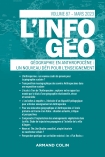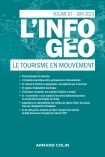
L'information géographique (2/2023)
Pour acheter ce numéro, contactez-nous
Recevez les numéros de l'année en cours et accédez à l'intégralité des articles en ligne.
Cet article propose une réflexion théorique autour de la notion d’habitabilité, utilisée ici pour exprimer les conditions de possibilité d’un habiter : faire (touristiquement) avec de l’espace ne va pas de soi et cela est un enjeu de comprendre dans quelle mesure un lieu est habitable pour les touristes. Le texte développe ainsi l’hypothèse que le tourisme a contribué à la mise en place d’un régime d’habitabilité spécifique à l’échelle mondiale à travers la construction matérielle et symbolique des lieux. L’argumentation avance ensuite l’idée que la question de l’habitabilité renvoie aussi au fait que les individus doivent être capables d’exploiter ces aménagements. La conclusion esquisse les nouveaux enjeux relatifs à cette habitabilité touristique.
This article proposes a theoretical discussion of the notion of habitability, used here to express the conditions of possibility of inhabiting: coping (touristically) with space is not self-evident and it is a challenge to understand to what extent a place is habitable for tourists. The text develops the hypothesis that tourism has contributed to the establishment of a specific regime of habitability on a global scale through the material and symbolic construction of geographical places. The argument then puts forward the idea that this question of habitability also refers to the fact that individuals must be able to exploit these developments. The conclusion outlines the new issues related to this tourist habitability.

